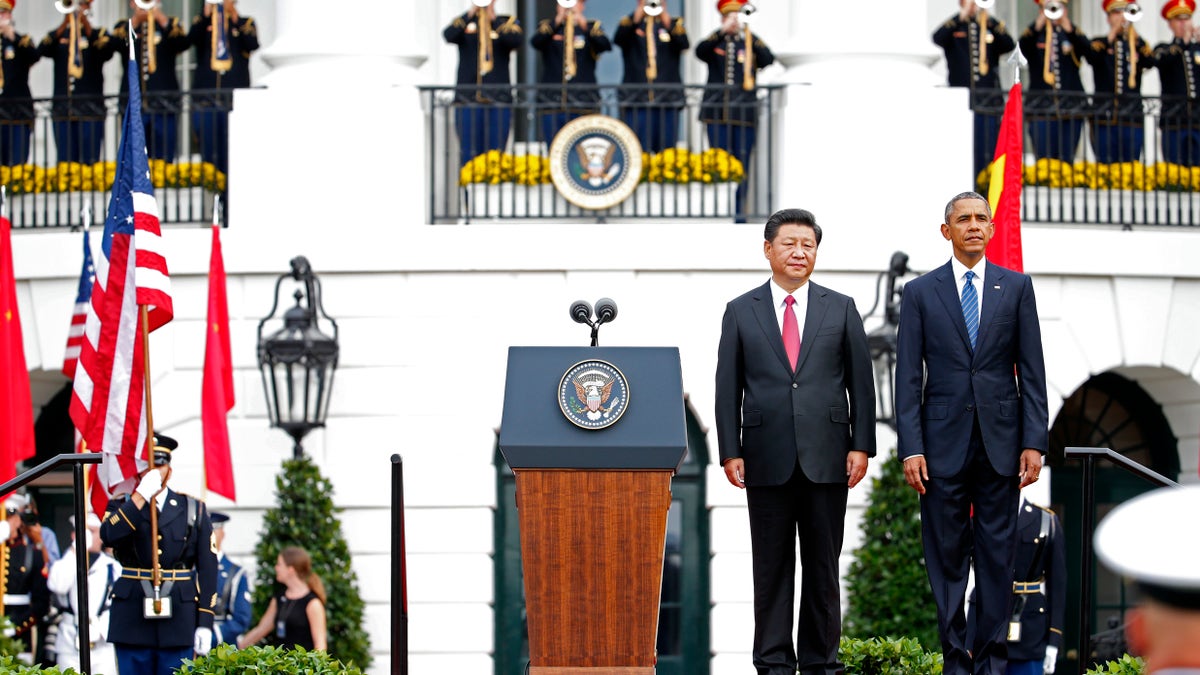
President Barack Obama and Chinese President Xi Jinping stand at attention for the playing of each counties national anthem during an official state arrival ceremony for the Chinese president, Friday, Sept. 25, 2015, on the South Lawn of the White House in Washington. (AP Photo/Evan Vucci)
“Xi is obsessed with strategic rivalry with the United States,” says Shi Yinhong of Renmin University in Beijing, referring to Chinese President Xi Jinping. “The summit won’t produce progress on strategic matters.”
Never have expectations been lower for a meeting between American and Chinese leaders. Yes, there will be an annex to an existing agreement regulating military air-to-air encounters; municipal, state, and provincial officials have made climate change commitments; and negotiators will probably produce a vague statement on cyberattacks on infrastructure in peacetime, but that appears to be the extent of the “deliverables,” diplomatic lingo for achievements. On most issues that divide America from China, including the rest of the cyber issues, there will be no progress.
If forward movement is so unlikely—and Professor Shi’s assessment looks correct—then why is President Obama even meeting with Xi on Friday?
American policymakers believe that dialogue is always good and that we should continue searching for solutions with Beijing. Take China’s cyberespionage, for instance. Instead of imposing sanctions on Chinese enterprises using stolen information for competitive purposes—as sources indicated the administration was considering—the White House has decided to try once again to put in place an agreement with Beijing.
Xi is making the trip to the American capital not to reach understandings with Obama or ink historic agreements. He is coming to Washington so China Central Television, the state broadcaster, can carry images of the South Lawn welcoming ceremony, the 21-gun salute, and North Portico state dinner.
Xi, on the other hand, approaches summits from a different perspective. He expects a “profound exchange of views,” his code for President Obama and him talking past each other, and it’s likely he will try to stall resolution of issues high on the American agenda. As Christopher Johnson of the Center for Strategic and International Studies has said, Xi is not going to do anything of “substance” in Washington, D.C.
Xi is making the trip to the American capital not to reach understandings with Obama or ink historic agreements. He is coming to Washington so China Central Television, the state broadcaster, can carry images of the South Lawn welcoming ceremony, the 21-gun salute, and North Portico state dinner.
Those images are intended to impress the Chinese people by showing the world’s most powerful democracy respecting their leader. In short, by according the full honors of a state visit to Xi, America is conferring legitimacy on the Communist Party of China.
Democracies rarely think about legitimization because they are inherently legitimate. One-party states, on the other hand, focus on the matter all the time, because they are not.
And China’s Communist Party is particularly concerned about its standing now that stocks are plunging, the currency is falling, growth is tumbling, and money is gushing out of the country. For a system that has primarily rested its right to rule on the continual delivery of prosperity, these symptoms of economic failure are nothing short of the first signs of political death.
None of this is to say we should not talk to Chinese leaders. There are, after all, so many disagreements to be resolved, and in some cases dialogue might help. Yet if we have to feed Mr. Xi while we talk, we are not obligated to put on a state feast. As Donald Trump has said, we can just hand the Chinese leader a Big Mac.
So let’s save the pomp and pageantry for some figure who deserves it. The Communist Party is engaged in a rivalry with the U.S.-led international system and, more important, a long-term argument with the Chinese people.
So if we help any side it should not be Xi’s. Let’s, for once, get on the right side of history.
